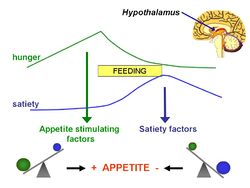Aminostatic hypothesis: Difference between revisions
Jump to navigation
Jump to search

imported>Lisa Robertson |
imported>Ashleigh Fraser |
||
| Line 8: | Line 8: | ||
''' | ''' | ||
== Experimental Evidence == | == Experimental Evidence == | ||
''' | |||
-experimental evidence has agreed with the aminostatic hypothesis | |||
-they have found that high protein diets act on satiety and thermogenesis | |||
''' | ''' | ||
== Science behind the theory == | == Science behind the theory == | ||
''' | ''' | ||
Revision as of 09:48, 25 October 2011
For the course duration, the article is closed to outside editing. Of course you can always leave comments on the discussion page. The anticipated date of course completion is 01 April 2012. One month after that date at the latest, this notice shall be removed. Besides, many other Citizendium articles welcome your collaboration! |
In 1956, Mellinkoff proposed the aminostatic hypothesis, stimulated by the observation that when normal individuals ingest protein, appetite diminishes as the serum amino acid concentration rises and vice versa.[1]
Experimental Evidence
-experimental evidence has agreed with the aminostatic hypothesis -they have found that high protein diets act on satiety and thermogenesis
Science behind the theory
Use as a method of weight loss
Obesity is everywhere. Around 33% of American adults and 17% of children are obese. In the UK, the statistics are not looking much brighter with 25% of adults and 10% of children showing signs of obesity. It has been proposed in the UK that 60% of men, 50% of women and 25% of children will become obese by 2050 if no preventative measures are taken.
Limitations
References
- ↑ Mellinkoff SM et al. (1956) Relationship between serum amino acid concentration and fluctuations in appetite J Appl Physiol 8:535-8 PMID 13295170
